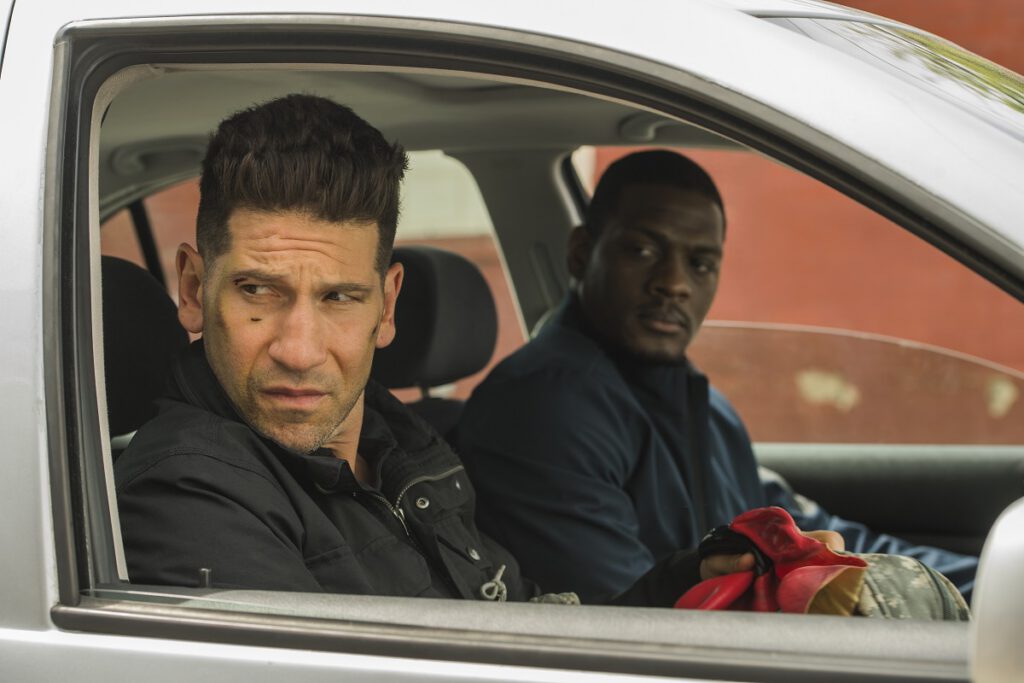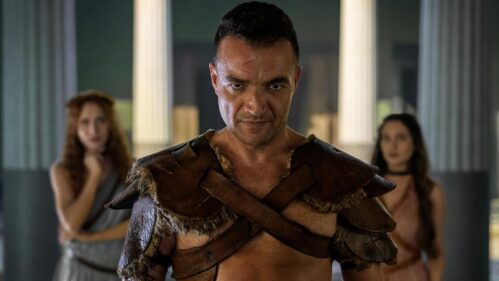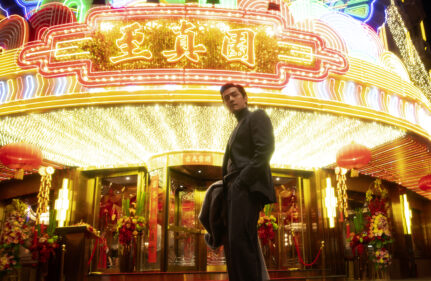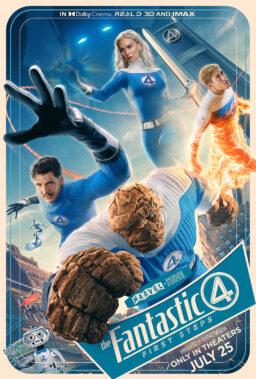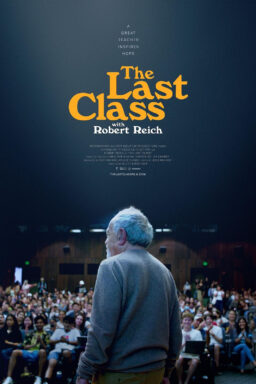Jon Bernthal is insanely good in “The Punisher.” A remarkable blend of skill, vulnerability, and the work of a great casting director have to coalesce for a performance like this to exist at all. Sometimes he moves, and it’s as though some sort of programming has kicked in for Frank Castle; his limbs carry him forward with incredible force and viciousness, but his face remains a mask of agony. At other times, his movement tells another story, and it’s as though Castle chooses to give over to some base instinct or primal drive, and he opens his mouth and bellows, allowing the beast to consume the man. Bernthal never forgets to check in on Castle’s adrenaline levels. Something happens—he’s startled, or frightened, or he kills or is wounded, and it lingers. The pulse takes a good long while to slow. This isn’t a man who makes jokes or acts affectionately with ease, and Bernthal shows us how hard it is for Castle to unclench the fist within. He is endlessly thoughtful. He plays Castle unsparingly, but with compassion. He gives him a soul, but does not let that soul off the hook. He is even, occasionally, funny.
It is not an exaggeration to call Bernthal’s performance in “The Punisher” one of TV’s best unsung turns, but existing as it does in the meandering, frustrating second season of the Netflix series, his excellent work is actually a bit of a double-edged sword. He’s so good that it underlines all the shortcomings of the writing. It becomes clear exactly how much shoddy storytelling he’s compensating for, because when the camera leaves him, it all falls to shit. It’s not that the other actors are bad. Far from it. They’re just not Jon Bernthal. When he can’t square the bad writing or fill in the gaps, it’s obvious the show has lost its way, because he’s been making it work, episode after episode, and even he can’t make this right. And his gripping performance adds one more layer of disappointment to the proceedings, because here’s the most unforgivable sin of the second season of “The Punisher”: You have a magnificent performance like this one at your disposal, and this is what you choose to do with it?

The action picks up well after the end of the first season, and Frank Castle has taken his get-out-of-jail-free card and hit the open road. The Punisher is dead, long live nice-guy drifter Pete Castiglione, the kind of regular Joe who stops at a roadside bar in Michigan just because the music sounds nice. A chance encounter gets him thinking about putting down roots, but then a smart-mouthed, wily teenager winds up in a jam with a whole lot of lethal force, and within minutes Pete’s gone and Frank’s back, covered in blood and aggravated by the bad guys and the scrappy teen alike. Amy (Giorgia Whigham) has suddenly become Castle’s responsibility, and that makes her a bloody pain in the ass. (She literally has to stitch up a wound in his ass.) The people chasing her don’t stop coming, so Frank doesn’t stop killing, and that’s the season—though of course, there’s a lot more to it than that.
And that’s all pretty good. Not all of it works—Frank ends up repeating himself a lot, and the appealing Whigham handles the scrappy, quippy stuff better than the heavy, haunted stuff—but it lives somewhere between “okay, let’s move along now” and “yes, Frank Castle and an unruly teenage daughter, more please, thanks.” But there’s another major arc to this season. It’s unwieldy to say the least, but one can fairly say that “The Punisher” is essentially split in half: There’s the “8 Simple Rules for Saving My Teenage Sidekick” storyline and all its component parts, and then there’s season one villain Billy Russo (Ben Barnes) and the mess that comes with him. The first half of the season essentially hinges on the idea that Billy may or may not remember what he did after leaving the military, up to and including the murder of Frank’s entire family—who, as Curtis Hoyle (Jason R. Moore) tells Amy, were pretty much also Billy’s family, making the betrayal that much more abhorrent. Dinah Madani (Amber Rose Revah), who basically haunts Russo’s hospital room, is certain he’s lying, and that he remembers it all. Krista Dumont (Floriana Lima), a psychologist with her own traumatic backstory, believes that he doesn’t, and is certain that he’s capable of and worthy of redemption. Russo is haunted nightly by dreams of a skull, says he misses his brothers-in-arms Frank and Curtis, and claims to have no idea who messed up his face. A very, very, very long time is spent on him remembering, and almost none in actually interrogating any of the ideas and themes found therein.

Barnes doesn’t lack abilities, and Revah (who flits, as Moore does, between both stories) fares about as well as anyone could within this stagnant, sour plot. Lima, terrific as Maggie Sawyer on “Supergirl,” gets the rawest of all raw deals—to say her storyline goes to every stale and empty place you think it will shouldn’t be a spoiler, but once you’ve seen one really bogus female psychologist storyline, you’ve seen them all. Still, she’s good. They all are. But there’s no helping this fact: By the time Billy Russo makes the same heavy-handed, joyless speech for the umpteenth time, it’s likely that viewers won’t be so much wishing that he’d get his memories back, as wishing that he’d forget more things, like his lines, or where he lives, or that he’d prefer to stay out of jail. It’s endless, it’s nowhere near as interesting as “The Punisher” thinks it is, and it has the disobliging habit of sucking all of the oxygen out of episodes that might not have been great, but could probably have been passable.
It’s too bad, because when the camera tears itself away from Billy Russo’s scarred-but-not-that-scarred face, it often lands on some pretty gripping fight scenes, and solid filmmaking in general. An early episode is particularly excellent, spending much of its runtime locked inside a police station with Castle, the kid, and a savvy Sheriff wary of both as they endure a ceaseless assault from outside forces, and that one in particular uses lots of the crayons in the violence Crayola box. Director Jeremy Webb shoots it at times like a tense, slow-moving western, at others a roomy thriller; he carefully frames shots so that the station feels at times like a safe haven, at others like an isolated death trap. When Castle finally leaves to deal with the problem, as you know he must, the camera stalks the woods as matter-of-factly as the man who kills his way through them. It’s a taut, thoughtful affair, quietly stylish, and brutal without glorying in its brutality.
Coincidentally, most of those descriptors are also words I’d apply to Bernthal (maybe not quietly stylish—the costumes, by Lorraine Z. Calvert, are terrific, but Castle’s not exactly a fashion plate). The best things about “The Punisher” in both its seasons are often reflected in his performance. But Bernthal plays Castle as a man who feels doomed to repeat the same brutal cycle over and over again, convinced that there’s only one thing he’s good for, and that, sadly, is also true of the second season of this series: repetitive, bleak, and unwilling to admit that it might be capable of doing anything new.
Full season screened for review.

